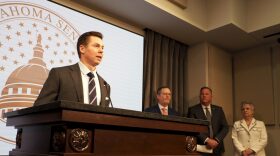Time is running out for efforts to have a bipartisan, citizen-led commission redraw Oklahoma’s legislative and congressional boundaries – a move that would take the process out of the hands of the Legislature.
A citizen-led group called Represent Oklahoma and a Democratic state lawmaker are pursuing separate paths to place a state question on the ballot that would allow voters to decide whether to overhaul the state’s redistricting process. Under the current method, the Legislature is responsible for the task after population figures are determined in the decennial census.
Both plans face significant obstacles as well as an approaching deadline.
Unless backers can get a state question on the ballot by sometime in 2020, they will have to wait another decade to try to join the growing number of states that have attempted to take partisan politics out of drawing legislative and congressional districts.
Six states have independent redistricting commissions, including Alaska, Arizona, California, Idaho, Montana and Washington. Citizen or legislative initiatives, meanwhile, are being organized in several other states.
“There is an urgency this year,” said Rep. Regina Goodwin, D-Tulsa. She is sponsoring the only legislation, among more than 2,800 bills or resolutions filed this year, that seeks a change to the state’s redistricting process. “It really is now or never.”
The Two Plans
Goodwin’s proposal would allow Republican legislative leaders to select four members of the commission and Democrats to select four. The ninth and final member, who can’t belong to either political party, would be selected by a majority vote of the eight other members.
This group of unpaid volunteer appointees would be able to hire experts and staff paid out of the budget for the state Senate and House.
The legislation, however, faces tough odds of being heard, much less passing, in the Legislature either this year or next.
The proposal, House Joint Resolution 1019, was assigned to the House Rules Committee – a panel Goodwin said traditionally has been a bill “graveyard” because of the high number of bills that are sent to the committee but never given a hearing.
Goodwin said she believes that given the merits of the proposal, if GOP leaders allow it to be heard, it would easily emerge from committee and find overwhelming support on the floor. Asked if she is optimistic that will occur, Goodwin responded, “Only time will tell.”
But another avenue exists to overhaul the state’s redistricting process.
In 2017, Represent Oklahoma, a nonprofit, was formed with the goal of raising $400,000 in an effort to file paperwork, fight off any legal challenges and collect signatures to get its own redistricting plan on the 2018 general election ballot.
That effort came up empty.
But Rico Smith, executive director of the organization, said the group has reorganized and is now targeting the 2020 elections.
Smith, who has worked on Democratic campaigns, said the organization plans to start the signature-collecting phase sometime this year. Organizers would have to collect about 178,500 signatures from registered voters within a 90-day period.
Smith said his group contracted with the Crowe & Dunlevy law firm to draft the initiative petition, which he said is ready to be submitted to the state.
Represent Oklahoma hasn’t publicly submitted a draft proposal. But documents provided to Oklahoma Watch show that, like Goodwin’s plan, it calls for an independent commission made up of private citizens from different political parties.
The group’s current plan calls for a 15-member panel with Republicans, Democrats, Libertarians and independents naming two members each and the rest being randomly chosen from applicants selected according to the state’s party affiliation representation and other demographic criteria.
Need for Change?
The concept of an independent, bipartisan redistricting commission is not foreign to Oklahoma.
Under the current process, if lawmakers fail to approve new maps for political districts, an independent commission composed of Republicans and Democrats must be convened to draw up and approve the maps. Voters approved a state question in 2010 providing the backup plan.
But this scenario is unlikely for a Legislature in which Republicans control 77 seats in the 101-member House and 38 seats in the 48-member Senate.
Goodwin said the current process gives lawmakers the ability to protect their own seats and create districts that favor their parties.
“I think it’s pretty clear cut that people should pick their elected representatives instead of elected representatives picking their people,” she said.
The question of whether political parties have unfairly gerrymandered districts to their advantage has been a source of intense debate nationwide.
The U.S. Supreme Court agreed earlier this year to hear two congressional redistricting challenges. One accused Maryland Democrats, and the other North Carolina, of gerrymandering districts. The cases could set a precedent for how the court treats ultra-partisan redistricting plans.

One argument from plaintiffs in these and other recent cases is based on a measure called the “efficiency gap,” a mathematical formula designed to detect the likelihood of partisan gerrymandering. A pair of researchers applied that measure to a dozen states, including Oklahoma, and concluded there was evidence of gerrymandering in all of them.
The Coming Deadline
Getting on a statewide election ballot is critical because the state must begin redistricting once the Census Bureau finalizes the census population results by the end of 2020.
Oklahoma’s Constitution requires the Legislature to pass congressional and legislative redistricting plans within 90 legislative days of the start of the 2021 session.
Goodwin and Smith said they believe their proposed redistricting panel would be ready to go if voters approve it in November 2020, if not in a primary election earlier.
Senate President Pro Tem Greg Treat, R-Oklahoma City, said some preliminary work, including hiring legislative staff to support redistricting is already underway.
But he gave no indication that Republicans would be looking to overhaul the redistrictingprocess.
“We know it’s right around the corner,” he said. “So we are preparing for that.”








